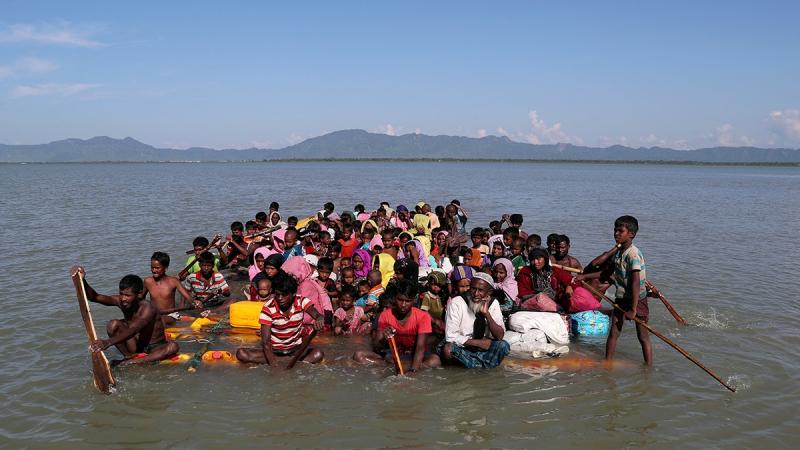 Nine months after the military crackdown, Rohingya Muslims still continue to flee Rakhine with nearly 11,500 arriving in Bangladesh this year, says the UN.
Nine months after the military crackdown, Rohingya Muslims still continue to flee Rakhine with nearly 11,500 arriving in Bangladesh this year, says the UN.
So far this year, 11,432 have arrived in Bangladesh, where more than 700,000 have fled since an August 2017 military crackdown in Myanmar's northern Rakhine state, Reuters reported quoting UN human rights chief Zeid Ra'ad al-Hussein.
In a speech at the UN Human Rights Council, he said that freshly-arrived Rohingyas have testified about violence, killings and burning of their homes.
"No amount of rhetoric can whitewash these facts. People are still fleeing persecution in Rakhine —and are even willing to risk dying at sea to escape," Zeid told the Geneva forum.
Many Rohingyas also report being pressured by Myanmar authorities to accept a national verification card that says they "need to apply for citizenship", he said.
The citizenship issue is at the core of discussions on their status, Zeid said, adding that the cards "mark the Rohingya as non-citizens, in keeping with the government’s characterisation of them as foreigners in their own homeland".
Authorities in Buddhist-majority Myanmar deny carrying out large-scale human rights abuses, says the Reuters report.
They claimed a crackdown in Rakhine is a necessary response to violence by the Arakan Rohingya Salvation Army (ARSA) militant group, which attacked Myanmar security posts on Aug 25 last year.
Kyaw Moe Tun, director-general of Myanmar's foreign ministry, said a top priority for his government was to find a "sustainable solution" in Rakhine.
It had agreed with Bangladesh in January 2018 that repatriation of refugees would be completed within two years, he said, without using the word Rohingya.
He said that Zeid's report contained information that was "distorted or exaggerated".
"The root cause of the tragedy was terrorism and terrorism cannot be condoned under any circumstance," Kyaw said.
 National
National
40093 hour(s) 12 minute(s) ago ;
Morning 08:06 ; Wednesday ; May 14, 2025
Rohingya influx continues with 11,500 arriving in 2018: UN
Send
Bangla Tribune Report
Published : 22:17, Jul 04, 2018 | Updated : 22:23, Jul 04, 2018
Published : 22:17, Jul 04, 2018 | Updated : 22:23, Jul 04, 2018
0 ...0 ...
/zmi/
Topics: Top Stories
- KOICA donates medical supplies to BSMMU
- 5 more flights to take back British nationals to London
- Covid19: Rajarbagh, Mohammadpur worst affected
- Momen joins UN solidarity song over COVID-19 combat
- Covid-19: OIC to hold special meeting
- WFP begins food distribution in Cox’s Bazar
- WFP begins food distribution in Cox’s Bazar
- 290 return home to Australia
- Third charter flight for US citizens to return home
- Dhaka proposes to postpone D8 Summit
Unauthorized use of news, image, information, etc published by Bangla Tribune is punishable by copyright law. Appropriate legal steps will be taken by the management against any person or body that infringes those laws.
Bangla Tribune is one of the most revered online newspapers in Bangladesh, due to its reputation of neutral coverage and incisive analysis.
F R Tower, 8/C Panthapath, Shukrabad, Dhaka-1207 | Phone: 58151324; 58151326, Fax: 58151329 | Mob: 01730794527, 01730794528


